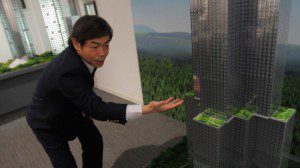Film Review: ‘City Visions’ #3
 Josh Broomer | 7 October 2014
Josh Broomer | 7 October 2014
‘Ecopolis China’, Directed by Anna-Karin Grönroos
Anna-Karin Grönroos’s insightful documentary is dedicated to exploring two possible Eco-City projects; a state of the art eco-research city and an Eco-City in a single tower.Both are intended to accommodate 20,000 people and share the aim of creating, in the jargon, a cleaner, brighter and more sustainable future. Yet in their design and construction they are completely different, and each is backed by radically contrasting characters.
Firstly, the reserved yet creative Finnish engineer Eero Paloheimo, who developed his ambitions from a base in his home city of Helsinki. Paloheimo’s dream is to build Eco Valley, or Miaofeng Mountain Town. It’s a green settlement dedicated to employing sustainable technology both in its construction and use. Many of the buildings are destined to be laboratories and innovation centres surrounded by sustainable housing, and the development makes use of existing quarry land and dense greenery.
Paloheimo was clearly frustrated that his ideas gained little acceptance on his home territory. But to his astonishment, his work has been well received in China and passed through the initial stages of the development process in just a couple of weeks – achieving what he could not do in Europe over a matter of years. In other words, in the West, where ideas of sustainability are lauded, such is the brake on development that nothing gets built. On the other hand, in China – which is criticised in the west for destructive development processes – a ‘green’ project can seemingly be speeded through planning. Or at least it can up to a point. Because as Ecopolis China details, slowly the project’s seemingly bright future begins to wither, compromised in its ideals and undermined by bureaucratic inertia and by the engineer himself being immersed in a language and culture that would be hard to grasp by any outsiders’ standards.
The second project sees Zhan Yue champion ‘Sky City’, his prefabricated vertical Eco-City. Yue is an energetic Chinese businessman, who has developed a concern for the future of China and the impact of his own actions in the world. While admitting that others seem to find his sky high ambitions to be hubristic and big headed, Yue appears to genuinely believe in the possibilities of changing the world, starting with his Sky City.
Building Sky City is a huge undertaking. Over 200 stories high, it utilises environmentally efficient construction techniques to create a vertical city that aims to incorporate urban farms within the tower, and as a consequence, to provide more open space around the base. Not surprisingly, Yue claims his tower will be built faster, cleaner and with less waste than a skyscraper utilising more traditional methods. In his single minded vision, he displays the polar opposite outlook to the archetypal tie-dye image of an eco-warrior; he is instead a powerful businessman aiming to realise a sustainable ideal not from the ground up but by creating a large scale top-down project. However, even as the project moves along ticking various boxes on the way, doubts over its ability to meet with planning and safety requirements means it faces an unclear future.
Each of these builders seeks to engage constructively with the context for their projects, for example, in Paloheimo’s case, visiting the Chinese villages his Eco-utopia would replace. Both these projects, however, also highlight a struggle between a pure Eco-vision and the messy reality of the complex situations that surround their construction. Palohiemo flounders amidst the expectations of local people and outside investors; Yue runs up against the lifestyles desired by the new residents of China’s rapidly growing cities, and the tricky practicalities of new construction technologies. However, to my mind, increased expectations should be celebrated rather than maligned. One of the benefits of this and other films in the City Visions series is that we gain a better understanding of such shifts.
This film is certainly highly informative. But it is Grönroos’s intimate filming of his two leading characters and the journeys they undertake with their projects that really enriches Ecopolis China. In this sense, the film highlights some of the ambitions, reservations and conflicts that surround the Eco-City topic today. Whether or not you agree with Eco-cities as a basis for architecture or settlements, the film provides a useful insight to its creators and the inner workings that surround them.
Ecopolis China is part of the series City Visions at the Barbican September / October 2014
Josh Broomer is an architectural assistant who has worked in the UK and beyond. He studied at the Glasgow School of Art and the Bartlett, and was a speaker and organising committee member for Mantownhuman’s Critical Subjects Architecture and Design Summer School.






